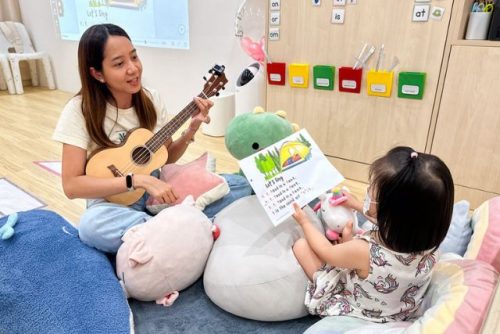Play is critical for a child to thrive, says Dr Michael Chia, who is a professor of paediatric exercise physiology at the National Institute of Education Singapore. In his article Taking Play Seriously, he explains that play not only provides an opportunity for the child’s creativity and imagination to blossom, it also allows them to learn to problem solve and make decisions.

However, the amount of time spent playing outside has lessened over the years.
According to an article by The Guardian, a survey revealed that three-quarters of UK children spend less time outside than prison inmates, and a fifth of the children did not play outside at all on a daily average.
In 2014, the national British newspaper The Telegraph reported in a survey of 1,000 parents, a quarter of children spend less than 30 minutes a week playing outside. A few reasons cited for a decrease in outdoor playtime were parents’ fears and the rise of digital technology.
Benefits Of Mixed-Age Play
Mixed-age play increases the quality of play the children engage in. It encourages children to take on different roles as they engage in different types of play. For example, during mixed-age cooperative play, children focus on working together which fosters the development of numerous social skills.
Studies show that older children who engage in mixed-age play are able to take on the perspective of the younger children. Older children provide verbal and nonverbal cues that raise the level of play for their younger peers; providing challenges for the younger children without overpowering them.
As older children are engaged in more sophisticated play, younger children are able to observe and model after them. This helps to extend their ideas and also encourages them to contribute to the play.

When faced with difficulties, younger children will approach the older children for help. This allows older children to think about the questions asked, relate them to their own experiences before teaching the younger playmates.
Apart from learning how to interact and communicate with children of different ages, each child also learns a variety of prosocial behavior, such as turn-taking, sharing, cooperating, caring for and taking responsibility for another.
Mixed-age play helps children develop conflict resolution skills. Children learn how to regulate their own emotions, ways to demonstrate and respond to the emotional cues of their playmates.
At school, children are grouped according to their age, and they may not get to spend time or play with children of other age groups.
What can you do to encourage more opportunities for mixed-age play?
How To Encourage Mixed-Age Play
1. Create opportunities

You can help to create more opportunities for mixed-age play. An example would be to host play dates for your child and invite their friends. Birthday parties, holiday celebrations and family gatherings are also good opportunities for your child to engage in mixed-age play.
⇒ Related Read: How to plan a successful playdate
2. Set ground rules
Set and enforce clear and age-appropriate ground rules. It is important to let your child understand that they will not always get their way while playing in a group and this does not give them the right to throw tantrums during a playdate.
3. Be realistic
Just like any other relationship, there will be days where the children play together without quarrels and days where there are bound to be arguments and disagreements. You can take on the role of a coach and help children learn from the ups and downs. However, don’t be too quick to mediate or step in to resolve for your children.
⇒ Related Read: Playground manners and principles
4. Freedom of choice
Give your children the freedom of choice in their play. Child-directed play and games where children can make up their own rules are usually the best scenarios for mixed-age play. Adults often come up with games that have too many rules and instructions, which may take away the space that children have to be creative. By giving your children the ownership of their play, they are able to come up with rules that can help them accommodate others.
By Lim Xin Rong, Chiam Li Yi Rebekah & Finjie Koh.
* * * * *
If you find this article useful, do click Like and Share at the bottom of the post, thank you.
Want to be heard 👂 and seen 👀 by over 100,000 parents in Singapore? We can help! Leave your contact here and we’ll be in touch.




























































Leave a Comment: